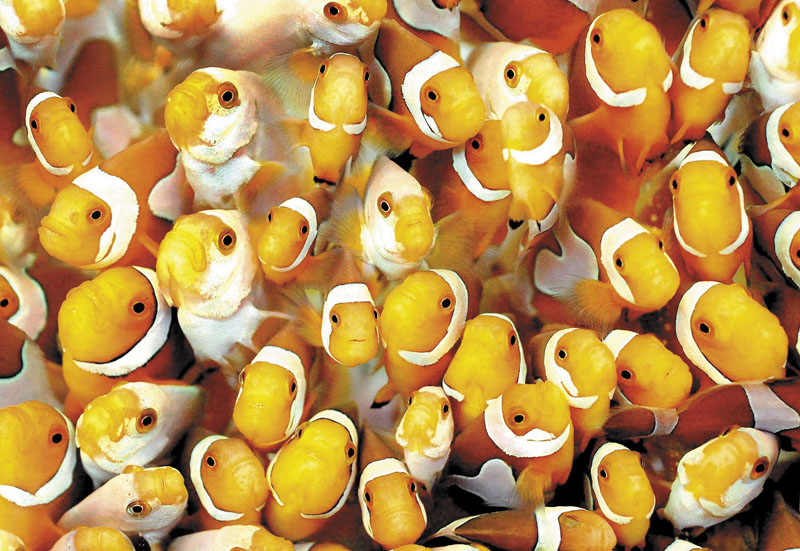AUGUSTA — This city may seem to be an unusual spot to start a business breeding tropical fish.
After all, Maine’s capital is about an hour’s drive from the ocean and its climate is far from tropical.
But city officials have learned that a local businessman wants to do just that: open an indoor tropical fish breeding operation with 200 to 400 small breeding tanks. The breeding area would be part of a larger aquaculture operation that could also process live mussels imported from Newfoundland in a large saltwater tank for resale.
“In Maine, aquaculture usually means cold-water food fish, like salmon raised in pens in the ocean. But not in this case,” said Matt Nazar, deputy development director for the city of Augusta. “This type of aquaculture could occur anywhere. It’s basically a big warehouse that you keep warm.”
The city has not yet received an application from prospective business owner Joseph Sutton, who also co-owns the well-known Augusta-based classified advertising publication Uncle Henry’s.
A representative for Sutton, though, has told city officials that the businessman hopes to breed tropical fish to be sold to pet stores, and process imported mussels and possibly clams in a saltwater habitat. The operation would be housed in a new building to be constructed behind the Uncle Henry’s on Route 17, at 525 Eastern Ave.
‘From reef to pet stores’
In anticipation of the proposal, city councilors have asked the Planning Board to study the issue and the city’s zoning. The review began last week.
Such an aquaculture operation is not explicitly an allowed use in any of the city’s zoning districts.
After lengthy debate, planners voted Tuesday to recommend the City Council modify the Land Use Ordinance to allow aquaculture as a conditional use in all zones where agriculture — or traditional land-based-farming — is already allowed.
Nazar said agriculture is an allowed use in many zones in Augusta, including the rural residential zone surrounding the potential new fish breeding site on Route 17.
Adding aquaculture, as a conditional use, to any zone where agriculture is allowed now would allow businesses breeding marine animals or plants to operate in many zones in the city, pending Planning Board approval. Such review would weigh the compatibility of proposed operations to neighboring properties and provide an opportunity for public comment.
Board member A. Delaine Nye said it seemed to make sense to allow aquaculture where agriculture is allowed.
Sutton could not be reached for comment this week.
Nazar said Jim Coffin, of Augusta-based E.S. Coffin Engineering and Surveying, representing Sutton, told him that the business could house 200 to 400 breeding tanks. Each tank would measure roughly 4-by-4-by-3-feet. Nazar said Maine’s harsh winter could actually be a plus for the aquaculture industry. Should a tropical fish somehow escape the breeding warehouse into nearby water, it would not be likely to survive in the wild and would not become an invasive species, he said.
Aquaculture is a fledging industry in Maine. University of Maine graduate Soren Hansen operates Sea and Reef Aquaculture in Franklin, which also raises tropical fish for wholesale distribution to pet stores.
Nazar said most fish in pet stores are caught in the wild, and only about 5 percent survive from reef to pet store. He said the survival rate of tropical fish bred and raised in captivity is higher.
Protecting neighborhoods
Adding aquaculture as a conditional use in zones where agriculture is already allowed in Augusta would not, however, pave the way for the mussel-processing portion of the potential new business.
Nazar said shellfish processing, even involving shellfish that arrive and depart still living, is considered food processing under state, federal and city regulations. In Augusta, it’s also classified as light industrial use, which is allowed in fewer locations than agriculture and not allowed in the area surrounding the potential Route 17 business site.
Planners were hesitant to change zoning rules to allow light industrial uses, such as the potential mussel-processing business, in part out of concern that doing so could also allow other industrial businesses that negatively impact residential neighborhoods.
Nye noted that protecting Augusta’s neighborhoods, and maintaining pleasant gateways on major routes into the city, was a key recommendation of the 2007 Comprehensive Plan.
“Right now, no matter how you come into the city, you see businesses,” Nye said. “As soon as we allow manufacturing where there are houses, people coming into town are going to wonder where people in Augusta live. Where are our neighborhoods? I have issues with that.
“We want businesses in Augusta to be successful. We want them to be huge. But if they’re going to be huge, we’ve got to be careful so we don’t have them in a residential area.”
Planners are scheduled to consider the light industrial zoning issue as it relates to mussel processing at their meeting on Jan. 24.
Keith Edwards — 621-5647
kedwards@centralmaine.com
Copy the Story LinkSend questions/comments to the editors.



Success. Please wait for the page to reload. If the page does not reload within 5 seconds, please refresh the page.
Enter your email and password to access comments.
Hi, to comment on stories you must . This profile is in addition to your subscription and website login.
Already have a commenting profile? .
Invalid username/password.
Please check your email to confirm and complete your registration.
Only subscribers are eligible to post comments. Please subscribe or login first for digital access. Here’s why.
Use the form below to reset your password. When you've submitted your account email, we will send an email with a reset code.